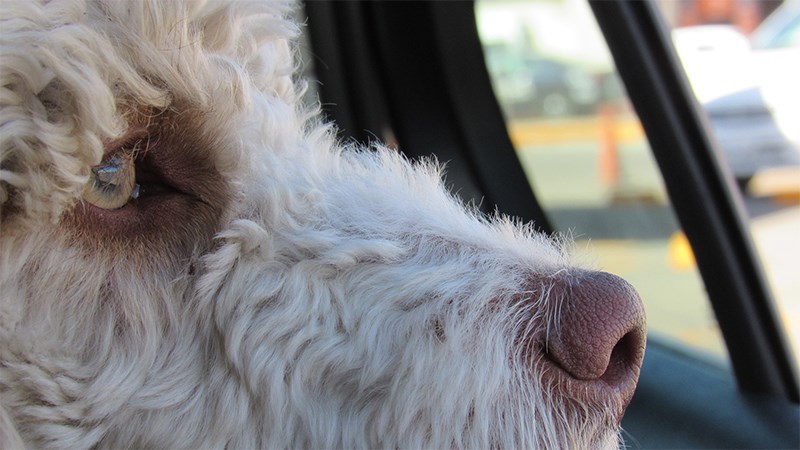Just as temperatures are about to rise, dog owners are being warned about leaving their pets in hot cars and Port Moody is considering a $100 fine for this canine confinement.
Tomorrow, Tuesday, Port Moody council is expected to vote on a bylaw that would fine people who leave an animal in an enclosed space, such as a motor vehicle or boat, without adequate ventilation.
Leaving an animal outside in extreme weather conditions could also be prohibited, if the bylaw amendment is approved, with a fine of $100.
“The ability to be punitive even if the dog was not at imminent risk of heat exhaustion or death, to prevent similar future occurrences, is seen as an effective deterrent to this reckless behaviour on the part of dog owners,” a report to city council states.
The prohibition comes as the city fields numerous complaints about people leaving their dogs in hot cars and bylaw staff currently have few options. They can only take possession of the dog once it has been extracted from the vehicle or other property, usually by the police, and can only give the dog owner a verbal warning.
Marcie Moriarty, chief enforcement officer for the BC SPCA, welcomed PoMo’s proposed bylaw amendment, suggesting it could be a deterrent while also helping to get the message across that leaving dogs in hot cars can be deadly and is not condoned.
“We are completely in support of these types of bylaw amendments because this is an issue that needs to be tackled on all sorts of front,” she said, adding later: “I hope it’s a summer we don’t have to talk about dogs in hot cars because this is a completely preventable animal matter and each year unfortunately we see people doing this, its frustrating.”
The SPCA would also like to see the community charter updated to give bylaw officers more powers in removing heat-stressed pets from cars.
As for how much ventilation is needed to keep a pet safe, Moriarty was careful to point out that it’s not how much the window has been rolled down but the temperature inside the car, which if above 26 C could be dangerous, depending on the age and breed of dog.
“Many people, they think if they park in the shade and roll down windows and inch or so that’s going to be sufficient, it’s not always the case,” she said.
HEAT STOKE
Dogs can get heat stroke, and owners to should be alert to the sigs of heat stress, including exaggerated panting (or the sudden stopping of panting), rapid or erratic pulse, salivation, anxious or staring expression, weakness and muscle tremors, lack of coordination, convulsions or vomiting, and collapse.
Breaking open a car window is not recommended, however, Only RCMP, local police, and BC SPCA Special Constables have the authority to enter a vehicle lawfully to help a pet in distress. Not only are you putting yourself at risk when you break a glass window, but you also risk harming the dog, according to the SPCA.
If you do see an animal in distress in a parked vehicle, it is recommended you do the following:
• Note the license plate, vehicle colour, make and model and ask managers of nearby businesses to page the owner to return to their vehicle immediately;
• If the animal is in distress, call your local animal control agency, police, RCMP or the BC SPCA hotline at 1-855-622-7722 as soon as possible. The call centre is open seven days a week, Monday to Friday from 9 a.m. to 5:30 p.m., and Saturdays and Sunday between 9 a.m. and 5 p.m. Emergencies outside of those hours should be reported to the local police department or RCMP.



